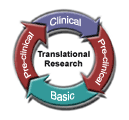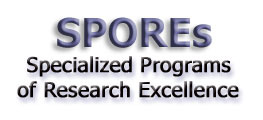

 |
 |
|||
 |
 |
 |
 |
 |
 |
 |
 |
|
Baylor College of Medicine and The Methodist Hospital Research Institute Principal Investigator: Helen E Heslop, M.D. The overall goal of the Lymphoma SPORE at Baylor College of Medicine and The Methodist Hospital is to devise in the laboratory, and validate in the clinic, interventional strategies, with the broad objective of improving outcome in Hodgkin's and non-Hodgkin's lymphomas and in chronic lymphocytic leukemia (CLL). A multidisciplinary team of laboratory and clinical investigators at Baylor College of Medicine and The Methodist Research Institute will pursue this goal through judicious integration of their current research interests. In Project 1, Drs Rooney and Bollard will validate new target antigens in Hodgkin's lymphoma, particularly cancer testis antigens, before testing cytotoxic T lymphocytes (CTLs) specific for these targets in patients with relapsed disease. Drs Dotti and Brenner in Project 2 plan to test T cells engineered to express anti-kappa-light-chain antibody, as a chimeric receptor, in patients with follicular lymphomas expressing kappa-positive immunoglobulins, with the aim of improving tumor cell recognition by the CTLs. They also propose to combine two B-cell-targeting moieties with distinct modes of cytotoxicity on the same CTL to enhance tumor cell killing by the modified T cells. The principal aim of Project 3, led by Drs Gottschalk and Heslop, is to improve outcome in EBV-positive Hodgkin's and non-Hodgkin's lymphomas by broadening the tumor specificity of CTLs and increasing their expansion in patients by providing additional antigen by vaccination. Project 4 will exploit an emerging concept in tumor immunology — that the negative effects of T-regulatory (Treg) cells in the tumor microenvironment can blunt the antitumor activity of CTLs or other immunotherapies. Thus, Drs Wang and Mims will evaluate whether the activation of Toll-like receptors on Treg cells, using specific ligands, can lessen or reverse the suppressive function of these cells, thus releasing the potential of T-cell-mediated immunity against the tumor. Finally, in Project 5, Drs Brenner, Foster and Goodell, building on observations in a CLL vaccine study, will test the hypothesis that CLL may harbor cancer stem cells whose defining molecules could be targeted for more productive therapeutic interventions. Each of these projects is clearly translational, addressing issues that arose in a bidirectional pathway, initially either from observations in the clinic (Projects 3 and 5) or from laboratory findings (Projects 1,2 and 4). Five cores are planned to meet the specialized requirements of this SPORE: Administration, Clinical Research, Biostatistics and Data Management, Cell and Vector Production, and Tissue Bank. The Lymphoma SPORE will also support a Developmental Research Program and a Career Development Program to foster the advancement of pilot translational projects and of young investigators whose research interests focus on lymphoma.
Research Project 1: Immunotherapy for Hodgkin’s disease This project builds on NCI-funded studies evaluating T cell therapy for the treatment of patients with relapsed EBV-positive Hodgkin disease (HD). Although the results are promising with several sustained complete remissions, over 70% of the patients referred to the study have had EBV-negative lymphomas. Drs Rooney and Bollard therefore plan to identify and target non-EBV tumor-associated antigens, such as the cancer testis antigens, which are expressed by as many as 55% of the malignant cells in Hodgkin disease and survivin, which is expressed in the majority, and to strategies that might overcome the mechanisms that protect tumors from the cytotoxic effects of immunotherapy. They will perform preclinical studies to optimize antigen presentation using different antigen-presenting cells produced with different combinations of cytokines and then proceed to a clinical trial of the most promising approach. They will also explore strategies to overcome tumor-derived inhibitory mechanisms to allow CTLs to maintain their function and proliferate within the tumor environment by genetically modifing the CTA-specific CTL lines to become resistant to Fas/FasL-mediated apoptosis and to circumvent the lethal anti-CTL consequences of indoleamine 2,3-dioxygenase (IDO) expression by dendritic cells.
Research Project 2: Chimeric T cell antigens targeting Ig kappa light chain in B cell lymphoma In Project 2, Drs Dotti, Savoldo, Brenner and Yotnda will test an approach that combines both the cellular and humoral arms of the immune response by adoptively transferring T cells genetically modified to express a B cell specific antibody incorporated into an engineered chimeric T cell antigen receptor (CAR). Initial studies have used antibodies targeting CD19 or CD20, but if these chimeric cells persist long term, they could induce significant impairment of humoral immunity. These investigators hypothesize that an alternative target to CD19/20 are the immunoglobulins (Igs) expressed by tumor cells from low-grade-NHL. They will perform validation studies and then evaluate this approach in a clinical trial. In further preclinical studies, they will combine two distinct B cell targeting moieties with two distinct modes of cytotoxicity in a single T cell, using a chimeric molecule encoding Pseudomonas exotoxin A (PEA) targeted to B cells by its linkage to a CD22 single chain antibody.
Research Project 3: T cell therapy targeting LMP1 and 2 in EBV+ve lymphomas In Project 3, Drs Gottschalk and Heslop will extend their current clinical study with LMP2-specific CTLs for patients with EBV-positive Hodgkin Disease and NHL, by broadening the tumor-specificity of the CTLs to include LMP1. This study is open for accrual (Clinical Trials.gov Identifier: NCT0062868).In follow-up studies, they will evaluate if providing additional antigen by vaccination will further increase the proliferation and expansion of adoptively transferred LMP1- and LMP2-specific CTLs and will optimize this approach in a murine model prior to testing in the clinic. They hypothesize that expression of IL15 or the silencing of SOCs1 in combination with LMP1 and 2 expression will enhance the vaccine-induced proliferation of adoptively transferred T cells.
Research Project 4: Regulatory T cells and Toll-like receptor signaling in lymphoma therapy In Project 4, Drs Wang and Mims will address whether clinical responses can be obtained in follicular lymphoma by targeting the population of T regulatory (Treg) cells that infiltrate this tumor. Dr Wang has recently demonstrated that activation of human Toll-like receptor 8 (TLR8) on CD4+ Treg cells effectively reverses the suppressive function of Treg cells. They will now determine whether the suppressive function of lymphoma-derived CD4+ Treg cells can be regulated by TLR8 signaling. After evaluation of various TLR ligands in preclinical models, the most promising approach will be tested in patients with follicular lymphoma.
Research Project 5: Targeting malignant stem cells in CLL In Project 5, Drs Brenner, Goodell and Foster hypothesize that it is possible to detect phenotypic differences between CLL stem cells and the overall tumor population, and that some of these “stemness” molecules can be targeted for therapeutic intervention. Dr Goodell has identified a “side population” (SP) of cells, defined by a high capacity to efflux certain lipophilic (Hoechst) dyes, a function attributable to overexpression of ABC transporter genes, most notably ABCG2. Tumor SP cells have a number of characteristics in common with a “tumor stem cell.” In a preliminary study evaluating an autologous vaccine of CLL cells expressing both CD40L (which activates the B-CLL cells through their CD40 receptor and increases their expression of co-stimulatory molecules) and IL2 (which augments any resulting T cell immune responses), the investigators observed a reduction in the circulating SP B-CLL population. In this project they will test whether a prolonged vaccination regimen can induce a prolonged reduction in the SP and mature B CLL populations. This study is open for accrual (Clinical Trials.gov Identifier: NCT00458679). They will also analyze both cell populations to identify potential targets for immunotherapy and chemotherapy in the tumor SP population.
Core A: Administration The goals of this service are to provide all projects with centralized administrative and clinical trial support, and to ensure effective communication among all projects and their cores. The administrative core will arrange internal group meetings and external advisory board meetings and provide assistance to each project and core leader with budgetary issues. It will also provide an infrastructure of personnel and services that will adequately support such research.
Core B: Clinical Research Services will be provided in regulatory affairs, study coordination, data management and quality assurance for clinical investigations. Study monitoring includes initial scientific review, data review, Quality Assurance and Quality Control. The core will also arrange internal group meetings of the investigators, attending physicians, statisticians, research nurse, data manager, and appropriate nurse managers to ensure that the clinical studies are conducted both safely and efficiently. Lymphoma SPORE clinical investigators are located at the following hospitals:
Current clinical studies open for accrual:
Core C: Biostatistics The goals of the core are to provide all projects with centralized biostatistics support and data management services for clinical trials and preclinical validation studies. Dr Weiss will assist in design and analysis of clinical trials and supervise data management.
Core D: Cell and Vector Manufacturing The goal of this core is to provide therapeutic vectors and cells produced under current Good Manufacturing Procedure (cGMP) conditions for the proposed clinical trials and preclinical (GLP) vectors for use in Project 3. The core will manufacture, store and release GMP grade products and maintain inventory records, as well as review, issue and maintain all Standard Operating Procedures, and document training of staff. This core will also provide samples for preclinical research on IRB-approved protocols. Core E: Tissue Core This core will oversee collection and distribution of tissue and blood samples. Drs Gresik and Chang will also supply pathology expertise to investigators in the program provide while Dr Steffen will provide Bioinformatics support.
Developmental Research Program The goal of the Developmental Research Program is to support innovative translational research projects that may in the future develop into full SPORE projects or secure peer-reviewed funding as independent projects.
Career Development Program The goal of the Career Development Program is to recruit and train investigators who will continue to contribute to translational research in lymphoma. The first year awardees are:
|